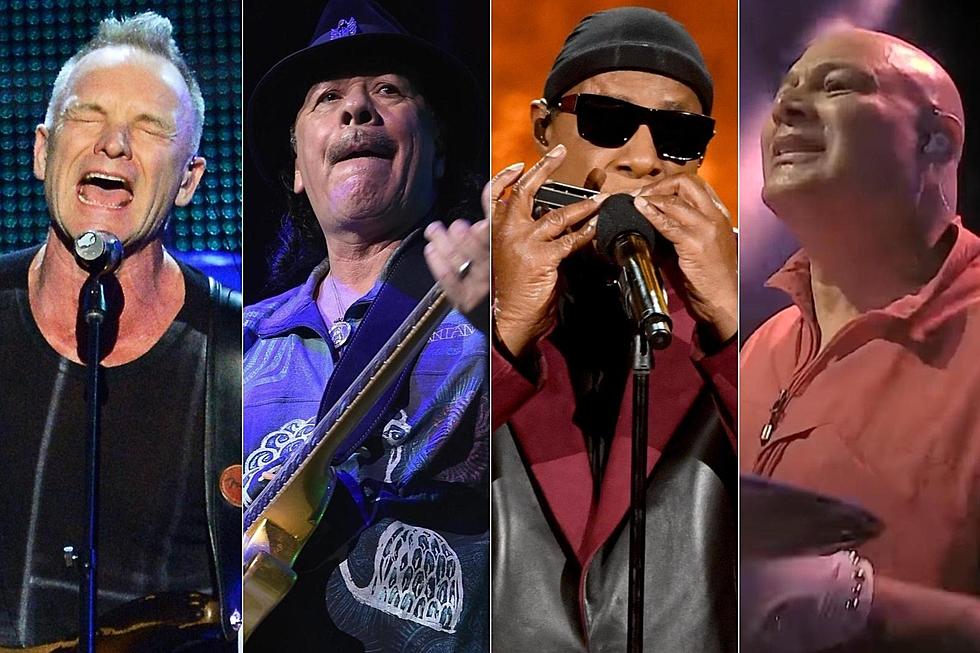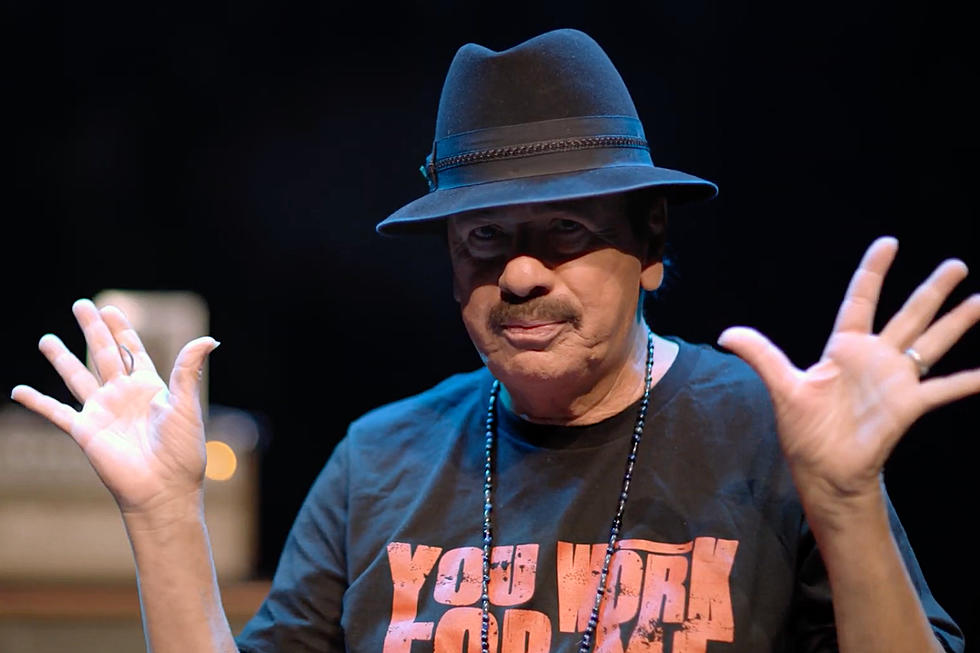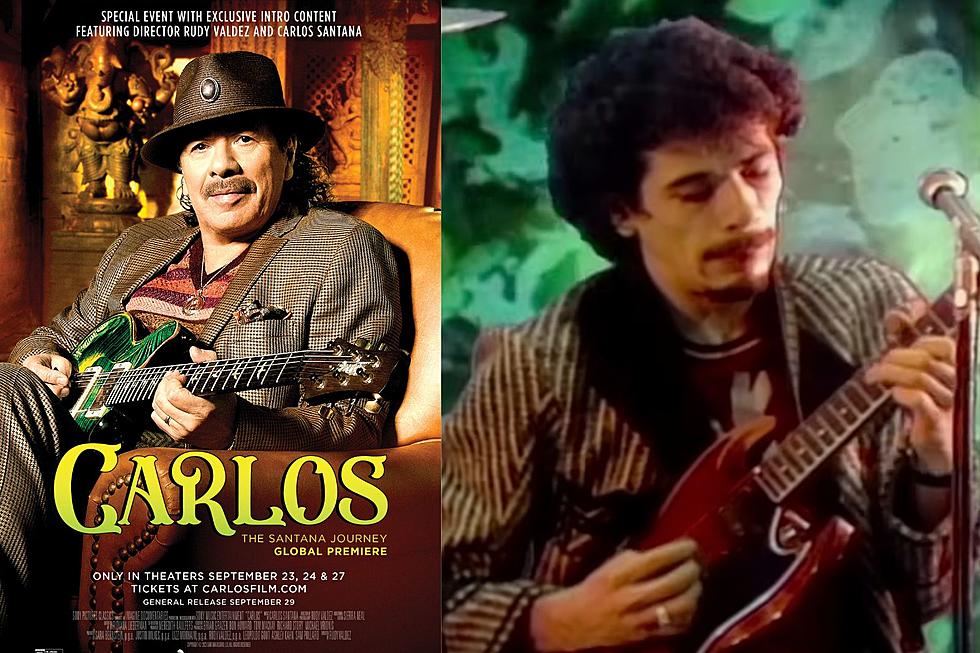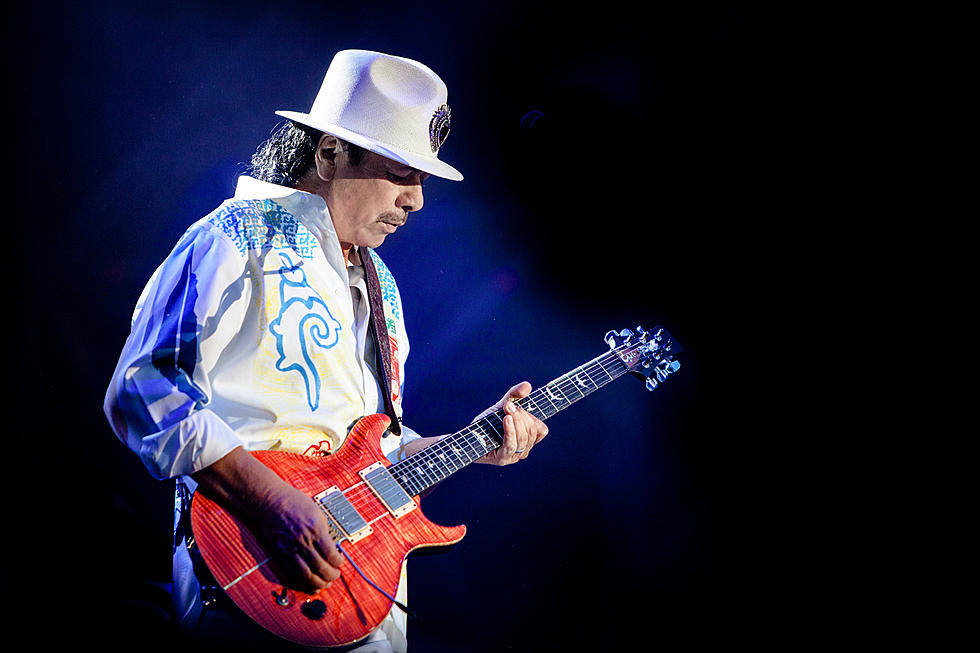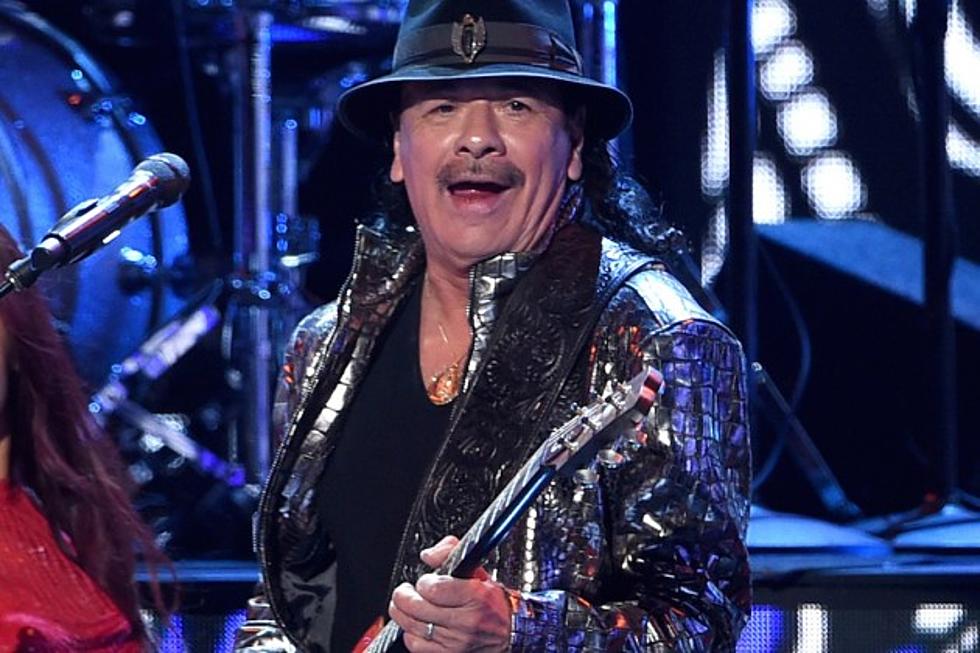
Santana on Music’s Healing Powers + Reuniting With His Band – Exclusive Interview
Carlos Santana appeared in a sweatshirt emblazoned with the face of Bob Marley -- echoing a key passage from his new autobiography ‘The Universal Tone: Bringing My Story to Light’ -- during an exclusive talk with Ultimate Classic Rock backstage at the Castro Theatre in San Francisco.
He credits figures like Marley, John Coltrane, Miles Davis and others as "inspirers and igniters, finders of blessings and miracles." Some might say the same thing about Santana, who talked about his remarkable journey during a stop on his book tour.
Starting in his tiny birthplace of Autlan, Mexico, Santana worked his way through the strip joints of Tijuana and later (very reluctantly at first) to the streets of San Francisco -- a trip that at times was as spiritual as it was salacious, and often anything but smooth:
How’s life?
Better than ever, with so many blessings, miracles and light.
You dedicate your book to your mother Josefina, and on the back of the book you note that you “want to play from the center of my heart” the way your musician father Jose did. How have your mom’s conviction and your dad’s charisma fueled you as a man and musician?
They both bring certainty. My father was a very, very charismatic person and he was really assured that he was the cat’s pajamas. He’d just walk into the room and women and men and children -- everybody adored him. You thought he was Michael Jackson or something. And when I was a kid I was like, I want that. The word is called adored. People adored my father because of his charisma. And my mother’s supreme conviction -- just supreme conviction. ‘God’s gonna give me this, and God’s gonna do it and God’s gonna give me this,’ you know. Next thing you know, she gets it! So, I learned from both of them certainty and assurance. When you’re playing music and you’re standing next to John McLaughlin, B.B. King or Buddy Guy, you’re not there to compete or compare. You’re there to compliment, so you know you can hold your own, and people will wait for either Buddy or me to finish. There’s always room for Carlos (laughs).
Define ‘The Universal Tone’ and how you carry it and others receive it?
You carry it with grace, elegance, dignity and integrity, and people receive it as an invitation to their own light, to their own luminosity. The Universal Tone means a frequency of ‘A Love Supreme.’ Of course John Coltrane, Bob Marley, Michael Jackson, musicians like that; Marvin Gaye, Jimi Hendrix. I’m one of them, you know and I don’t flinch saying it. I’m one of them because I aspire to constantly be a conduit to the same frequency of luminosity.
You’re wearing the mighty Bob Marley on your chest right now. You wear it proudly. Why still to this day?
Because he’s still here. One love. You need to play ‘One Love’ with all these riots happening, all these protests. I invite all peaceful protesters to wear all white only, and play music to shock the world’s foundation, conquering fear. Create banners that say what is the collective lesson we can all learn from this about love. If you dressed in white, police know that you’re there not to burn, loot or destroy. You’re only there with integrity to make a point. Hopefully, next time people protest, if you wear all white, police got to know that your intensions are noble and they shouldn’t hurt you. Otherwise, we do have some issues with police, and they will be really in trouble. Otherwise we will retaliate. We will retaliate, because I belong to people who on one hand -- I am spiritual, which is I want compassion. On the other hand, I do believe that it’s better to die on your feet than live on your knees. So don’t push us, because you don’t have enough bullets for all of us. We will take over.
How do you explain why music is such a healing force?
Music is a healing force because it reminds people on a molecular structure of your own divinity -- your own luminosity. We are holy, sacred and divine. Divineness is your DNA, it’s not in your DNA, it is your DNA. When you’re born in this planet, they indoctrinate you. Indoctrinate you is another word for putting shackles on your brain with guilt, shame, judgment, condemnation and fear in the distorted, twisted, crooked concept of sin. God does not recognize sin. He did not create it.
Your dad was a musician, your brother, your son. Does ‘The Universal Tone’ exist in our DNA? Is it in our genes?
Of course. It’s encoded in your soul. It’s your fingerprints, your individuality, your uniqueness. There’s only one of you. God created multiplicity, but the best thing is uniqueness and individuality.
What is your secret to maintaining balance between your stage and studio life as a musician, and your home life as a man?
Just staying in a place of humility. Humility is constantly saying, “I am not the body, I am free. I still am as God created me.” My mother taught me this: You have what you have because of people and you are who you are because of God. Always be grateful to both.
I wanted to ask about just one of the hundreds of songs that you mention in the book and that is ‘Song of the Wind,’ of which you write, “To this day I listen to ‘Song of the Wind’ and break down inside hearing [original Santana band member] Gregg [Rolie]’s playing on that one. No solo, just a simple, supportive organ part that is not flashy or anything but supremely important to the song.” And you go on to mention that the original Santana band was coming to an end during the session. Share your thoughts on that song, and then update us on the return of the original Santana band.
I brought that song to the band. I kept playing it as a jam and I played it over and over again and I said, “We gotta record this song.” [Former Santana member] Neal [Schon] plays so beautiful, Gregg played magnificent -- and to me I think I just spilled over what I was feeling because I knew it was the end of that era. It was like the Beatles breaking up. We couldn’t put it back together because Gregg and Neal [who left to form Journey] were pregnant with their own vision. So that song quotes [jazz and blues guitarists] Grant Green, Gabor Szabo, Otis Rush, and Neal quotes everybody from Eric Clapton -- but it sounds like us, and there are beautiful stories within that song. I’m happy to say that Neal is the one that brought the band back together. He stayed on me like a laser beam for about a year, chasing me everywhere, man -- restaurants and shopping malls -- and he would be there and say, “Man, Carlos, man, we gotta do a thing together, you and I, man.” And then he says, “You know, I wanna do something with so and so and so and so,” and I said no, I don’t wanna play with so and so and so and so. And he goes, “Oh.” And I said there’s nothing wrong with so and so but I don’t wanna do anything with so and so. I said, I tell you what, why don’t we call Gregg Rolie and [former Santana band members] Michael Shrieve and Mike Carabello and go that way. He goes, “Oh, okay.” And so we went this way and we’re gonna do ‘Santana IV.’
Interview by Jim Villanueva
More From Ultimate Classic Rock


